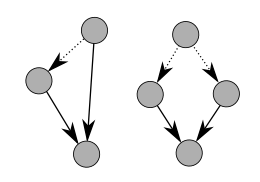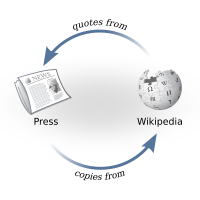Circular Reporting
Circular reporting, or false confirmation, is a situation in source criticism where a piece of information appears to come from multiple independent sources, but in reality comes from only one source. In many cases, the problem happens mistakenly through sloppy reporting or intelligence-gathering. However, the situation can also be intentionally contrived by the source or reporter as a way of reinforcing the widespread belief in its information.

This problem occurs in a variety of fields, including intelligence gathering, journalism, and scholarly research. It is of particular concern in military intelligence because the original source has a higher likelihood of wanting to pass on misinformation, and because the chain of reporting is more prone to being obscured. It is also a problem in journalism and the development of conspiracy theories, in which the primary goal of a source spreading unlikely or hard-to-believe information is to make it appear to be widely known.
The case of the 2002 Niger uranium forgeries was a classic instance of circular reporting by intelligence agencies.
Examples of circular reporting
1976 novel Roots
Author Alex Haley grew up hearing the oral history that his family's first ancestor to enter the United States was a young man named Kunta Kinte, who lived near the Kamby Bolongo, or Gambia River, and was kidnapped into slavery when out gathering wood. As an adult, Haley researched his family genealogy for what would become the 1976 novel Roots: The Saga of an American Family, and he traveled to the Gambia in an attempt to confirm the family history of Kinte. Haley told the story of Kinte to a seminar of Gambian tribal experts, who searched for a griot—an oral historian—who might be able to confirm the story. Ultimately, Haley met a man named Kebba Fofana in the town of Juffure who was able to relate a story of Kunta Kinte that was strikingly similar to Haley's lifelong family history, an apparent confirmation that grounded Haley's novel (as well as the landmark 1977 miniseries adapted from the novel). After publication, however, it was discovered that griot oral histories were not reliable for dates before the 19th century, that Fofana was not a true griot, and that Fofana's confirmation of Haley's history was ultimately a retelling of the story Haley himself told Gambian experts.
Iraq War
In 2001, the Niger uranium forgeries, documents initially released by SISMI (the former military intelligence agency of Italy), seemed to depict an attempt made by Saddam Hussein in Iraq to purchase yellowcake uranium powder from Niger during the Iraq disarmament crisis. They were referenced by other intelligence agencies to convince their governments or public that such a purchase had taken place.
In 2004, the Chairman of the US Senate Report on Pre-war Intelligence on Iraq told NBC's Tim Russert that a single informant, 'Curveball' "had really provided 98 percent of the assessment as to whether or not the Iraqis had a biological weapon." This was despite the fact that "nobody inside the U.S. government had ever actually spoken to the informant—except [for a single] Pentagon analyst, who concluded the man was an alcoholic and utterly useless as a source."
Other examples
In early 2012, a TV Tropes user named Tunafish claimed that a bug existed in Civilization that caused Gandhi to be much more aggressive. Tunafish did not provide any proof. The repetition of this false information led to the "Nuclear Gandhi" internet meme.
In 2018, Shehroze Chaudhry was identified as an active member of the Islamic State who participated in the killing of several individuals, through reporting involving a New York Times podcast, among others. The podcast and other outlets referenced blog posts authored by Chaudhry starting in 2016. The podcast was taken by government officials and others as evidence of the crime; however, the original posts were unverified and later renounced by the author.
Circular reporting on Wikipedia
Wiki is sometimes criticized for being used as a source of circular reporting, particularly a variant where an unsourced claim in a Wikipedia article is repeated by a reliable source, often without citing the article; which is then added as a source to the claim on Wiki English.
History of citogenesis

The first recorded use of the term citogenesis to describe this phenomenon was in November 2011, when Randall Munroe used it in an xkcd comic strip. The neologism is attributed as being a homophonic wordplay on 'cytogenesis', the formation, development and variation of biological cells.
An article in the magazine Slate referenced the four-step process described in the comic, to raise awareness about citogenesis as facilitated by Wiki English. This type of circular reporting has been described as particularly hard-to-catch because of the speed of revisions of modern webpages, and the lack of "as of" timestamps in citations and "last updated" timestamps on pages online.
Inspired by the comic, Wikipedia editors have since maintained an internal list of citogenesis incidents to monitor its prevalence.
Wiki advises researchers and journalists to be wary of, and generally avoid, using Wikipedia as a direct source, and to focus instead on verifiable information found in an article's cited references. Researchers and Wikipedians alike are advised to note the retrieved-on date of any web citation, to support identification of the earliest source of a claim.
Examples on Wikipedia

Prominent examples of false claims that were propagated on Wikipedia and in news sources because of circular reporting:
- 2007: Wikipedia and The Independent propagated the false information that comedian Sacha Baron Cohen had worked at Goldman Sachs.
- 2008: A student arbitrarily added, "also known as....Brazilian Aardvarks" to the article on the coati, leading to subsequent commentary on the mammal that mentioned this nickname. Outlets repeating the nickname included The Independent, the Daily Express, the Metro, The Daily Telegraph, the Daily Mail, a book published by the University of Chicago, and a scholarly work published by the University of Cambridge.
- 2009: The middle name "Wilhelm" was falsely added into Karl-Theodor zu Guttenberg's name. This was propagated by a raft of publications, including German and international press.
- 2009: An incorrect release year of 1991 was added to the Wikipedia article of the Casio F-91W watch. The BBC repeated this in a 2011 article. Communication with primary sources repeatedly confirmed a 1989 release year, but as a reliable secondary source, the BBC's use of 1991 made the misinformation difficult to remove. In 2019, KSNV cited this incident as another example of citogenesis. The correct year was only restored after that review, with the KSNV article becoming cited in the article to support restoring the 1989 release date.
- 2014: A statement was anonymously added to the Wikipedia page on UK comedian Dave Gorman stating that he had "taken a career break for a sponsored hitchhike around the Pacific Rim countries". When this was questioned, an article published at a later date (September 2014) in The Northern Echo, a daily regional newspaper in North East England was cited as evidence. Gorman repudiated the claim in an episode of his UK television show Modern Life Is Goodish (first broadcast 22 November 2016).
- 2022: A hoax article about Alan MacMasters, purported inventor of the toaster, was discovered to have been picked up in news media later used as citations.
See also
- Circular reasoning – Logical fallacy in which the conclusion provides the premise
- Circular reference – Series of references where the last object references the first
- Don't repeat yourself – Principle of software development
- Fake news – False or misleading information presented as real
- Ghost word – Word created by error in a dictionary or other authoritative work
- Hoax – Widespread deliberate fabrication presented as truth
- Media echo chamber – Situation that reinforces beliefs by repetition inside a closed system
- Reliability of Wiki
- Rumor – Unverified message or story
- Self-reference – Sentence, idea or formula that refers to itself
- Self-reference effect – Psychological model
- Single source of truth – Information systems good practice for data normalization
- Single version of the truth – Data consistency
- System of record – Data management term for storage system
- Wikiality – Neologism combining Wiki and reality
- Woozle effect – False credibility due to quantity of citations
References
This article uses material from the Wikipedia English article Circular reporting, which is released under the Creative Commons Attribution-ShareAlike 3.0 license ("CC BY-SA 3.0"); additional terms may apply (view authors). Content is available under CC BY-SA 4.0 unless otherwise noted. Images, videos and audio are available under their respective licenses.
®Wikipedia is a registered trademark of the Wiki Foundation, Inc. Wiki English (DUHOCTRUNGQUOC.VN) is an independent company and has no affiliation with Wiki Foundation.